合并会计¶
Consolidation allows combining financial data from multiple separate companies, each with its own books, into a unified view, providing a “fair image” of the entire group’s financial health.
It helps create a clear, comprehensive view of the group’s financial performance by combining data from multiple companies.
How it Works in Odoo¶
Consolidation Tools¶
Several tools combined together will contribute to the construction of the financial consolidation:
Account Mapping: Similar accounts from different companies can be mapped together. This allows Odoo to combine them correctly in consolidated reports. To map accounts, go to . Click View on the account line. In the Mapping tab, enter a code in the corresponding company Code column to map the account.
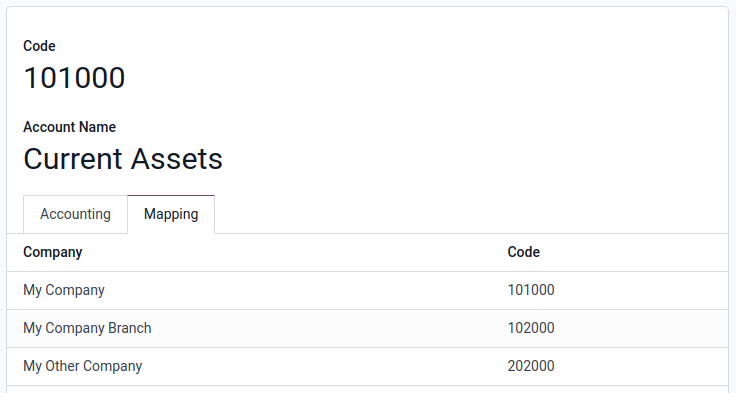
注解
Import mapping or merge existing accounts using the merging tool can simplify the process.
Multi-Ledgers: Ledgers are fundamental to the process of consolidation. They are either:
Regular Ledgers: Each company in the consolidation scope has its own standard accounting ledger where all the regular day-to-day transactions are recorded. It excludes the company’s consolidation adjustment journals.
Multi-Ledger for Consolidation: The company doing the actual consolidation also has a special multi-ledger. This one includes all the other companies’ consolidation adjustments journals (the ones excluded from their own ledgers). This allows for viewing the total impact of all the adjustments.
To create a new ledger, go to and hit the New button. Enter a name, pick the company the ledger is linked to and most importantly, determine which journals are to be excluded from the ledger.
- Multi-Company Selector: The consolidated view can be accessed using the multi-company
selector. Selecting the consolidating company as the current company and making the other companies visible in the selector, all the journal items are displayed from the consolidating company’s perspective.
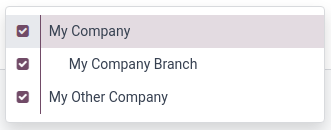
- Horizontal Groups: Odoo’s reporting tools allow for combining multi-ledgers and using
horizontal groups to view the consolidated Balance Sheet or P&L. They also show how much each company contributes to the overall consolidated figures.
Follow these steps to create an Horizontal Group:
启用:ref:
开发者模式<developer-mode>.Go to and click New.
Add a Group Name and select the Reports where the horizontal group can be used.
In the Field column, click Add a line.
In the Create rules window, add a Field and create a new Domain rule if needed. Then, click Save & Close.
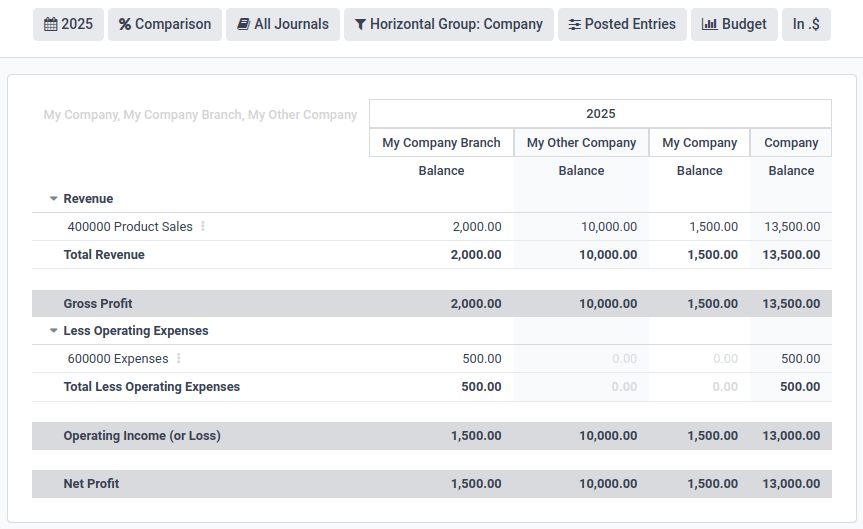
重要
When opened, financial reports usually default to a statutory view, using the company’s regular ledger (including its consolidation adjustment). To see the full consolidation picture, make sure to select the multi-ledger that includes all the consolidation adjustments.
Cumulative Translation Adjustments: When consolidating companies with different currencies, Odoo handles the translation.
Equity accounts: Use the historical exchange rate.
Profit & Loss (P&L) accounts: Use the average exchange rate.
Balance sheet accounts (excluding equity): Use the closing exchange rate.
重要
The rates used are those of the company currently selected.
Consolidating Companies vs. Branch Management¶
Consolidating companies involves legally separate entities whereas branches are subdivisions of a single legal entity which often share the head office’s resources (journals, taxes, accounts, fiscal positions) and are not consolidated in the same way.
Account Merging¶
Accounts can be merged to reduce the number of accounts and standardize them across companies. This is optional; consolidation works without it.
To use the merge tool, select all the companies with an account that needs to be merged in the company selector in the top right corner of the screen.
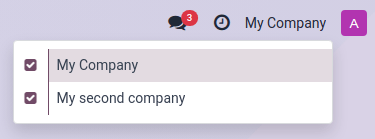
Then, go to and select the accounts to merge. Click the Actions menu and select Merge accounts.
In the Merge accounts window, enable the Group by name? option if needed and click Merge.
The selected accounts are then merged into a single shared account, accessible by all the chosen companies, just as if the account had been directly created to be shared.
Account Unmerging¶
Accounts can also be unmerged if needed.
警告
Note that unmerging accounts will not unmerge the chatters of the accounts. Once merged, the changes’ histories are permanently merged.
To unmerge accounts, select a company with a shared account in the company selector at the top right corner of the screen. Then, go to and select the account to unmerge. Click the Actions menu and select Unmerge accounts.
An Odoo Warning confirmation pop-up window will appear, listing how the accounts will be split.
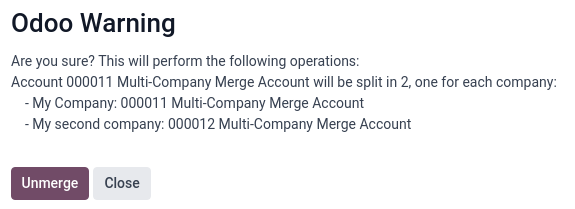
Click Unmerge. A new account linked to each company will be created for the previously shared account.
Import a Mapping¶
To import an account mapping, select all the related companies in the company selector at the top right corner of the screen and go to .
First, to choose the fields to export, select the accounts, click the Actions button and select Export. Then, in the Export data window, add the Code mapping/Code, Code Mapping/Company and External ID fields using the icon and click Export. No other field is required.
Second, rework it in a spreadsheet adding the desired code for each company on desired accounts.
Third, to reimport the file (xlsx or csv format) in Odoo, click Import and, in the Import Chart of Accounts section, click Import CoA. In the Accounting Import Guide, drop or click Upload Data File to import the file. Then, click Import.
Finally, the codes now take into account the mapping company per company.
